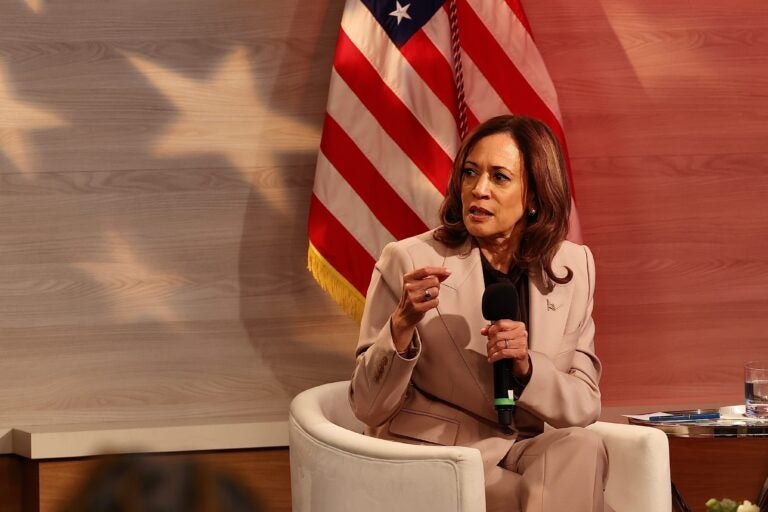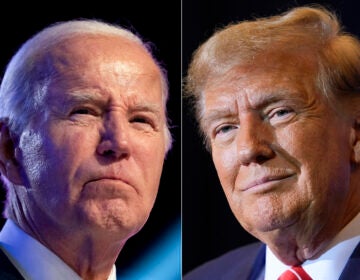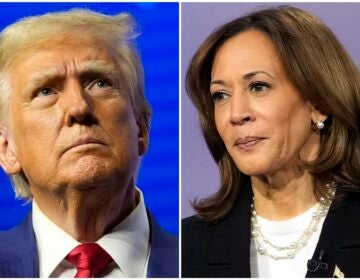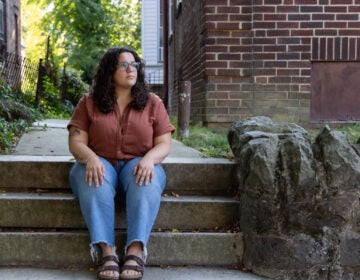Harris addresses lower support from young Black men
Kamala Harris has gone up in the polls, but support from Black men is lower than what Biden needed to win Pennsylvania in 2020.

Vice President Kamala Harris interviewed by NABJ journalists at WHYY Sept. 17, 2024 (Emma Lee/WHYY)
What questions do you have about the 2024 elections? What major issues do you want candidates to address? Let us know.
Just before his unexpected withdrawal from the presidential race, President Joe Biden was experiencing a significant downturn in the polls. As the presidential election drew closer, it became increasingly clear that Biden would be unlikely to secure a victory in Pennsylvania, the key and pivotal swing state. Contributing to the Democratic Party’s challenges was a notable lack of enthusiasm among Black voters, both in Pennsylvania and across the country for his candidacy.
Those initial grim predictions appear to have shifted now that Kamala Harris has taken her place at the top of the ticket. National polling, and my own reporting, find much more excitement for the vice president among voters of color.
However, as Harris pointed out at WHYY this week, the Black community is not a “monolith,” and their votes can’t be taken for granted. And new data from the NAACP suggests many young Black male voters plan to vote for Republican nominee Donald Trump.
Democrats can still heavily depend on a majority of the Black vote, meaning they are incentivized to pour resources into getting them out during the election. An unprecedented 771,192 Black Pennsylvanians turned for the vote in 2008, and 95% of them voted for Obama. It led the Democrat to a decisive victory in the commonwealth, with roughly 55% of the vote.
The difference narrowed in 2012, but Obama still won Pennsylvania with 93% of the Black vote and about 52% of the total electorate. In both those elections, Black men voted in the 90th percentile for Obama.
That changed in 2016 when Hillary Clinton became the first woman to lead a major party ticket. While she still received between 88% and 92% of the Black vote overall in Pennsylvania, based on exit polls, only 83% of Black men supported her, according to NBC News’ exit polls. Additionally, 150,000 fewer Black voters turned out in that election.
In 2020, the Black vote bounced up back to 750,000 and Black men, again, voted overwhelmingly for the Democratic nominee, handing him Pennsylvania in a year when turnout hit historical records on both sides.
Therefore, recent revelations that young Black male voters are increasingly conservative and a quarter of them say they will vote for Trump is likely disconcerting to Harris and Democrats. While Black women are seen as stalwart supporters — often voting for Democrats at levels as high as 99% — in an election this close, a significant decrease in support among Black men may make the difference.
So why do they support Trump?
Derrick Mason, of Chester, told me what a lot of other Trump voters and Republicans say.
“I think his views in helping out as far as the economic situation and definitely taking care of immigration,” he said. “That’s a big one for me and definitely just leading this country.”
It was with all this in mind that Gerren Keith Gaynor, White House correspondent at TheGrio, asked the vice president during the National Association of Black Journalists panel discussion at WHYY Tuesday, “What is your message to young Black male voters who feel left out of this economy and how can your economic policies materially change your lives?”
Answering that question, Harris said that she understood the challenge.
“I’m working to earn the vote, not assuming I’m going to have it because I am Black, but because the policies and the perspectives I have — I understand what we must do to recognize the needs of all communities,” she said, before she talked about increasing access to capital for starting businesses and making homeownership easier, both obstacles the Black community has faced.
We’ll know in November if the vice president’s message will be enough to win her the votes she’s asking for.

Get daily updates from WHYY News!
WHYY is your source for fact-based, in-depth journalism and information. As a nonprofit organization, we rely on financial support from readers like you. Please give today.







